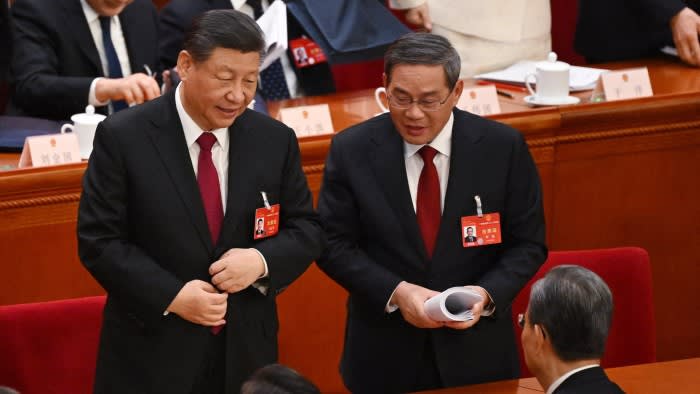
Unlock the Editor’s Digest for free
Roula Khalaf, Editor of the FT, selects her favourite stories in this weekly newsletter.
The maiden speech of Li Qiang, China’s premier, to the National People’s Congress this week felt like a blast from the country’s ideological past. He lavished paeans of praise upon his boss Xi Jinping — China’s most powerful leader since Mao Zedong — but failed to outline in detail how Beijing plans to combat multiple economic impediments.
Investors drove Hong Kong’s stock index lower on Tuesday after Li set a target for gross domestic product growth of “around 5 per cent” for this year but did not unveil a significant stimulus package to reach that goal. Indeed, the premier’s focus on “high-quality development” — which elevates priorities such as technological self-reliance and economic security — shows that Beijing is no longer single-mindedly pursuing GDP growth.
Li has styled himself as a loyal “executor” and a “practical doer” in formal remarks since he took office last year, sending a clear message that Xi — not Li — is in charge of China’s economic portfolio. This is at odds with more reformist phases in recent decades when China’s premier tended to oversee the economy while the general secretary of the Chinese Communist party, a post that Xi holds, looked after politics.
He was at pains in his hour-long address to make clear where the current power lies. The achievements of 2023, Li said, were thanks to Xi, “who is at the helm, charting the course, to the sound guidance of Xi Jinping Thought on Socialism with Chinese Characteristics for a New Era”. The display of subservience came one day after Beijing scrapped a tradition that China’s premier gives a televised press conference at the close of the congress.
Such signals, taken together, contribute to a sense that it is ideology more than generating prosperity that really animates Beijing. This cognitive shift is, in turn, driving a reorientation of international capital away from Chinese assets to seek returns in Japan, India, south-east Asia and other markets.
Li’s speech gave little cause for optimism that China will achieve its “around 5 per cent” target this year, following an official 5.2 per cent growth rate last year. His remarks included no detailed plans to support consumer spending, even though consumer price deflation is at its deepest since the 2008-09 financial crisis.
An objective to expand domestic demand was demoted from top priority in last year’s report to third place this year, according to an analysis by consultancy Gavekal Dragonomics. Outranking it were the two industrial policy goals to “modernise the industrial system” and develop “new quality productive forces”. Both goals involve promoting China’s technological emergence.
In terms of fiscal support, one modest new impetus was unveiled. A Rmb1tn ($139bn) issuance of special Treasury bonds was scheduled to finance “security capacity in key areas”. This was left undefined but probably denotes infrastructure. In another sign of the importance placed on security, Li announced a 7.2 per cent increase in defence spending to Rmb1.6tn, outpacing the official growth target. China has the world’s second-largest defence budget after the US and Li vowed to oppose “external interference”.
There are real risks for China in prioritising security, technology and self-reliance over GDP growth. The country’s vulnerabilities — a faltering property market, hefty local government debts, deepening deflation, high youth unemployment and others — all require growth to avoid further slumps. Yet there is little evidence that Beijing has the policies to achieve the growth target it has declared. More profoundly, it should heed warnings from its own history: when ideology infests economics, sharp reversals may follow.


